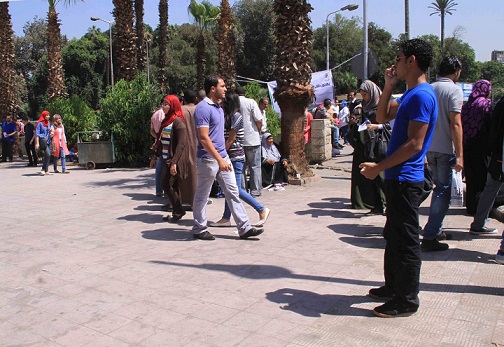By Heba Fahmy
CAIRO: The Free Egyptians Party (FEP) criticized in a statement on Tuesday a meeting of political parties aimed at coordinating a coalition for the upcoming parliamentary elections.
The FEP, headed by business tycoon Naguib Sawiris, said it didn’t want to turn the upcoming People’s Assembly elections into “second class” elections, where political powers force their guardianship over the people through a unified list, instead of having free direct elections.
It added that the unified list would deprive Egyptians of their right to choose from a number of parties, who will best represent them.
The Muslim Brotherhood’s Freedom and Justice Party held a meeting titled “the National Alliance” to discuss establishing a unified list in the upcoming parliamentary elections slated for September.
“Egypt is going through an important phase that requires agreement on building the country and achieving reform,” said Mohamed Morsi, head of the FJP. Political powers shouldn’t give the opportunity to those who want to tamper with Egypt and its future, he added.
Last week, the Muslim Brotherhood (MB) and Al-Wafd Party called on Egypt’s political parties to present a unified list in the upcoming parliamentary elections to create the opportunity for equal representation in parliament.
Thirteen parties attended the meeting including Al-Wafd, Al-Ghad, the Front and Al-Tagammu parties, according to Ikhwan online. They said that they were still considering the matter.
Head of Al-Ghad and presidential hopeful Ayman Nour told Daily News Egypt that his party would make its final decision on Saturday.
The FEP expressed its “astonishment” that Al-Wafd party would run ahead of the rest of the liberal parties to cooperate with the Brotherhood, despite their differing ideologies.
“We do not stand against any kind of alliance or agreement between political groups, as long as it’s based on a common ground of ideologies, principles and directions,” the statement read.
Political analyst Amr Hashem Rabie of the Al-Ahram Center for Political and Strategic Studies disagreed, saying that any party that goes against an alliance between two renowned political powers like that of the Brotherhood and Al- Wafd will lose the battle.
“Alliances and coalitions competing in the upcoming parliamentary elections must be supported and valued in order to stand against the counter- revolutionary forces,” he told DNE.
Al-Wafd agreed with the FJP to establish a joint committee to discuss important issues especially the voting system in the upcoming elections and the debate about drafting the new constitution.
Bahaa Abu Shaqa, Al-Wafd’s vice president, previously told DNE, “We told (The Brotherhood] … that Al-Wafd refuses any political party with a religious or secular background.”
He added that, “the aim (of the alliance) is to have real and fair representation of all political powers in parliament so that no single group dominates it.”
The FEP statement questioned the direction of the political Islamic movements including the Brotherhood, stressing the importance of establishing a civil state according to Egypt’s previous 1923 and 1971 constitutions.
“We announce that we will join any alliance that is based on principles of civil state and citizenship,” the statement concluded.
With elections slated for September, many political parties, especially those formed in the past few months, said they wouldn’t be ready by this date. Political powers said that only the Brotherhood and former members of the disbanded National Democratic Party had a chance of winning the majority of the seats.
Critics expressed concern about Islamist influence over parliament, which will choose the members of the constituent assembly tasked with drafting the new constitution.
In a recent Gallup poll, 15 percent of the respondents said they would support the Brotherhood. That was the highest number any political entity got on the poll. Ten percent said they would vote for NDP. The majority of respondents said they didn’t support a theocratic state.
The Muslim Brotherhood said they will compete for 40-50 percent of the seats.
The coalition of “the Egyptian Project”, which includes six parties, has already decided to compete with the unified list in the upcoming elections. The Coalition includes the Democratic Front Party, the Free Youth of Egypt, the Egyptian Coalition and Egypt The Mother Parties. However the coalition is yet to decide whether it will join Al-Wafd and the Brotherhood in their call.
Leading member of the Democratic Front Party Wael Nawara said that forming alliances between several political groups strengthens them and the competition between coalitions in the parliamentary elections.
“We have so many political parties now especially after the revolution,” Nawara said.
“Uniting the parties which have the same ideologies and similar political programs benefits the parties as well as the people voting for them.”

